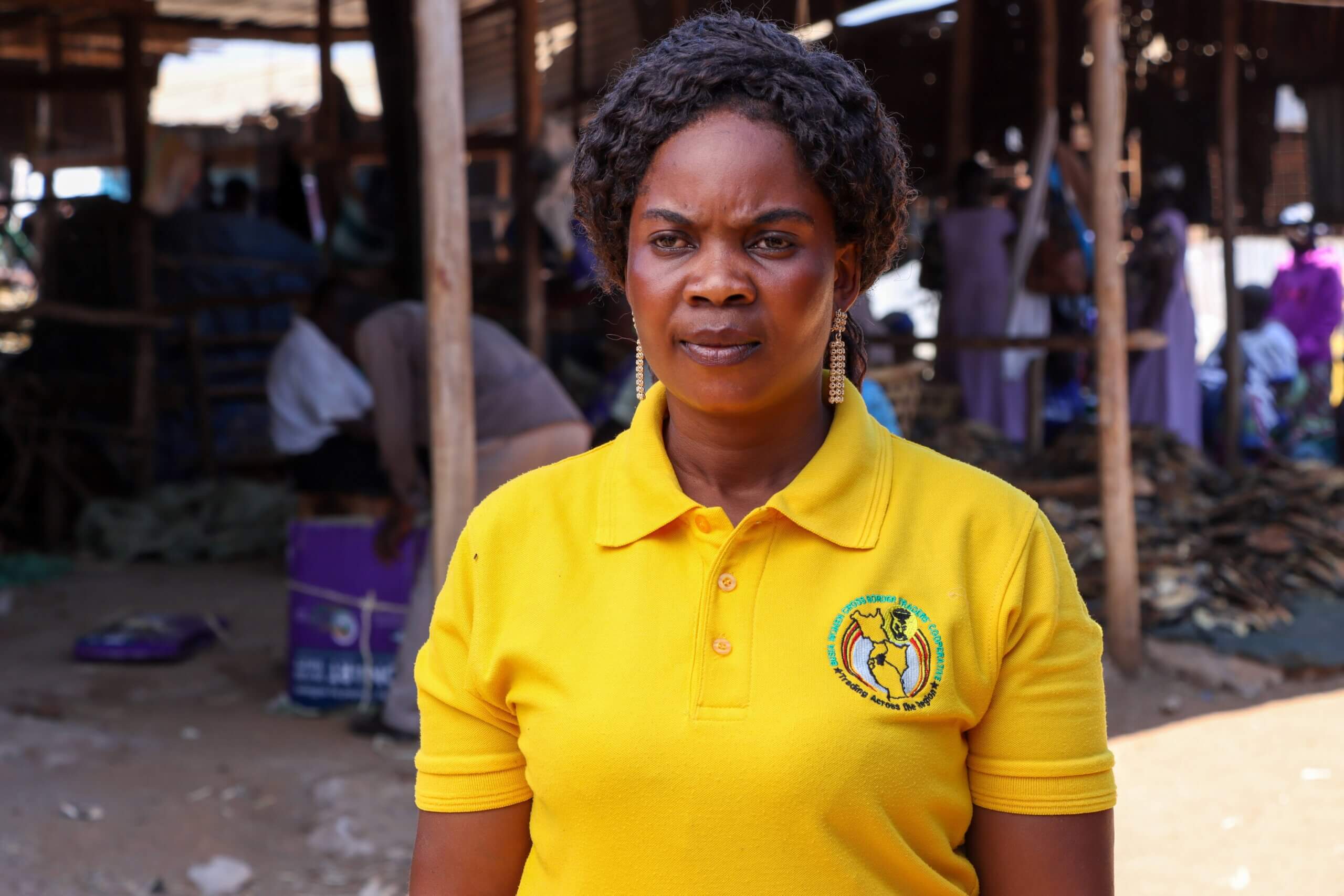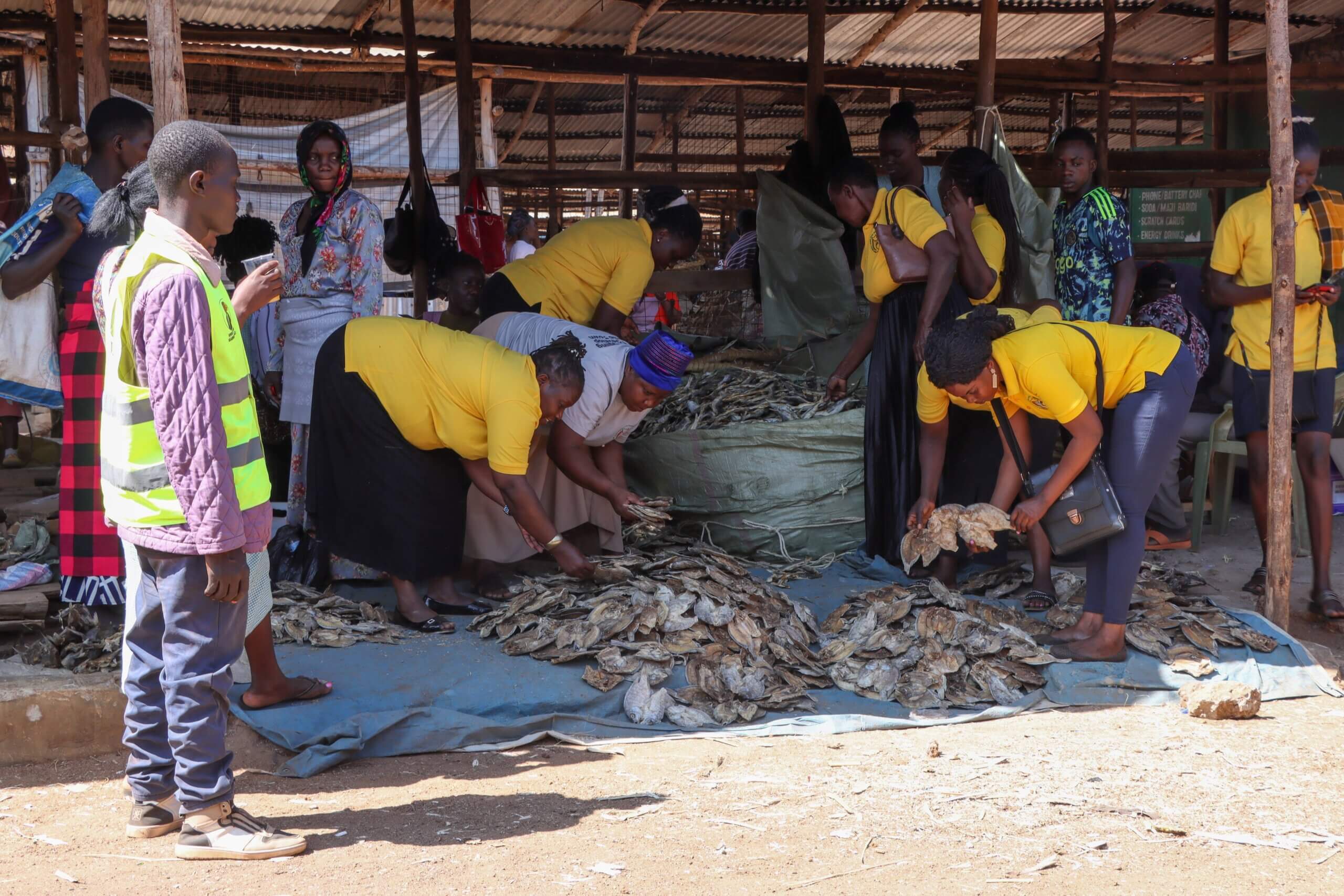Asmin Abdalla shares a moment with Mariam Mbaabu, chair of Busia Women Cross-Border Traders Cooperative.
As the sun rises over Busia, the bustling border town between Kenya and Uganda comes to life. Traders haggle over prices, trucks roll through customs, and the scent of fresh fish fills the air. Among them is Natocho Susan Charity, a member of the Busia Women Cross-Border Fish Cooperative. For years, cross-border trade was risky and unpredictable. Women like Susan avoided official border routes to escape high fees and complex regulations, instead using informal paths known as panya routes, which were often dangerous. “Boda boda riders stole from us. We faced harassment, and officials demanded bribes,” Susan recalls. “We lost most of our earnings.”
With funding from Global Affairs Canada, TradeMark Africa (TMA), partnered with the Eastern African Sub-Regional Support Initiative for the Advancement of Women (EASSI), to provide training, legal aid, and support for women to formalise their businesses. “Agriculture is an important source of income for women in East Africa, with high percentages of women working in the sector across the region, including 96% in Burundi, 76% in Kenya, 84% in Rwanda, 71% in Tanzania, and 77% in Uganda,” explains Anna Nambooze, TMA Country Director for Uganda and South Sudan. “The Women in Trade project supported these women to increase their incomes and improve their livelihoods through trade.”

Natocho Susan Charity once forced to use informal routes to trade, now safely crosses using formal border points.
TMA supports the transition of traders to structured and formal trade through associations or cooperatives. Joining a cooperative has made it significantly easier for women traders to network, access information and markets and thus run their businesses successfully. Susan explained that traders first grouped into trading clusters before registering as the Busia Women Cross-Border Fish Cooperative. With legal registration, they could use formal border points, which made the process safer and more efficient. As Susan puts it, “When you cross at the formal border points, it is safe. It saves time and you don’t have to pay the police or others.” Working as a group has also strengthened their business model. They buy fish in bulk, negotiate better prices, and share profits, half of which are reinvested in the cooperative with the other half distributed among members.
Julius Wanyama, another cooperative member, says the group has enabled them to share ideas and make collective decisions. He added that TradeMark Africa’s support enabled them to gain national visibility. “With TMA exposing us to a national platform, we can now access any office, speak, and be heard.” Their united voice even enabled them to recover a shipment of fish that was once confiscated, saving the group from financial loss. Increased profits have translated into improved living standards, with members able to educate their children and improve their homes.

Members of the Busia cooperative inspect fish. Buying in bulk and sharing profits has improved earnings and reduced their exploitation.
In Malaba, another border between Kenya and Uganda, and approximately 29 kms away from Busia, women traders who once endured mistreatment now know their rights and how to report cases of gender-based violence (GBV). Irene, Chairperson of the Produce Cross-Border Women Traders Association, highlighted the transformation. “Before, there was so much violence because women did not know where to seek help. But now, thanks to the awareness by TMA and EASSI, women understand their rights and report abuse. They also have the confidence to speak up,” she said, noting that independent platforms such as Sauti, a mobile-based tool that shares trade procedures and information on how to report gender-based violence and other forms of abuse, are making a real difference.
Mary Oula, a textile trader in Malaba, also spoke of her transformation. Before TMA’s intervention, she felt like she was “gambling” in business. With business training, she quickly learned how to manage finances, improve customer service, and market her goods. Today, she tracks her sales, expenses, and profits. Furthermore, registering her business allowed her to trade confidently across the border. She even made a major sale through WhatsApp, exclaiming: “One client paid me $ 53.85 (KSh7,000) for a business deal. I was so shocked, I said, ‘Wow! This is how we grow in business.’” Mary now feels focused and ambitious in her textile trade. Rose Mchoi, another Malaba trader, pointed to the growing financial independence of women. “Even in cases where a man is not providing at home, a woman can now buy school supplies for her children. We are not just in the kitchen anymore, we are part of the economy,” she said.
TMA and EASSI also recognised the unique challenges traders living with disabilities face. They facilitated the formation of a cooperative in 2023 to amplify their voices and strengthen their support systems. Abitha Joy, who works with the group, noted that while transport remains a challenge, the training has allowed members to grow their businesses and access wider markets. “With the knowledge we have gained, we can now diversify and negotiate better,” Joy said. “We move freely in the market, rely less on others, and this is improving both our earnings and our confidence.” Starting with 30 members in 2020, the cooperative grew to 70 in 2023 and formally registered with the Uganda Revenue Authority, acquiring a Tax Identification Number (TIN). This has enabled them to secure a grant of five million Ugandan shillings (approximately $1,351) to expand their businesses.
As Mariam Mbaabu, Chairperson of the Busia Women Cross-Border Traders Cooperative Union proudly stated, “The women can now put something on the table. In Busia, persons living with disabilities can work, provide for themselves, and not rely on well-wishers.” Asmin Abdalla, a trader living with a disability who sells nutritious flour, added: “With support from our union chairperson, Mrs Mbaabu, we formed a group that was later registered as a cooperative. Now, we are no longer working alone. We support each other, grow together, and take charge of our future.” TMA supported the cooperative to acquire a machine for producing chicken feed. Now, the group plans to purchase another machine for milling maize. They have already secured premises to house their value-addition equipment and are confident in their steady path toward financial independence. “This is just the beginning. With the right support, we can grow even further and create better opportunities for our members,” Asmin said with a confident grin.















